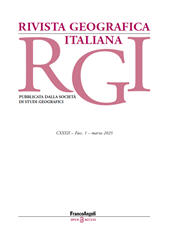Spazi punk per abitanti queer : risignificare la città ineguale camminando / L'orgogliosa eccentricità punk neurodivergente : riflessioni sulla prospettiva geografica della città autistica / Le città in gioco : per un futuro urbano radicalmente ludico
93-112 p.
Pubblicato da Einaudi, La città autistica si presenta subito come un'opera innovativa. Il libro affronta un tema quasi del tutto inesplorato in geografia le pratiche urbane delle persone neurodivergenti colmando una lacuna significativa, ampliando il dibattito sulla diversità dei modi in cui gli spazi urbani sono percepiti e vissuti, e mettendo in luce quanto le nostre soggettività siano esposte in modo differenziato e spesso diseguale alle norme e ai dispositivi impliciti che regolano la vita quotidiana. Il libro mostra anche come la geografia possa offrire potenti strumenti analitici per indagare fenomeni di grande rilevanza sociale che raramente vengono affrontati da una prospettiva socio-spaziale. La geografia proposta ne La città autistica dialoga con una pluralità di saperi disciplinari e specialistici, proponendo una visione al tempo stesso interpretativa e trasformativa. Il libro invita infatti a ripensare gli spazi urbani come capaci di accogliere e valorizzare le differenze,
con l'obiettivo di promuovere città più inclusive. Data l'importanza del libro, la Redazione ha ritenuto opportuno dedicare un forum a La città autistica, invitando Maurizio Memoli, Valentina Giuffrida e Giada Peterle a riflettere su di esso da diverse prospettive: dal rapporto tra neurodivergenza, spazio e identità, alle potenzialità del metodo autoetnografico nello studio delle città (autistiche). L'obiettivo è quello di arricchire la discussione sul libro, invitando a continuare il suo sforzo di immaginare e creare città più aperte, giuste e plurali. [Testo dell'editore]
Published by Einaudi, La città autistic (The Autistic City) immediately presents itself as a path-breaking work. The book addresses an almost completely unexplored topic in geography the urban practices of neurodivergent people filling a significant gap, broadening the debate on the diversity of the ways in which urban spaces are perceived and experienced, and highlighting the extent to which our subjectivities are differentially and often unequally exposed to the implicit norms and dispositifs that govern everyday life. The book shows also how geography can offer powerful analytical tools to investigate phenomena of great social relevance that are seldom approached from a socio-spatial perspective. The geography proposed in The Autistic City dialogues with a plurality of disciplinary and specialist knowledge, proposing a vision that is both interpretative and transformative. Indeed, the book invites us to rethink urban spaces as capable of welcoming and valuing differences,
with the aim of promoting more inclusive cities. Given the importance of the book, the Editorial Board has deemed it appropriate to dedicate a forum to The Autistic City, inviting Maurizio Memoli, Valentina Giuffrida and Giada Peterle to reflect upon it from different perspectives: from the relation between neurodivergence, space and identity, to the potential of the autoethnographic method in the study of (autistic) cities. The aim is to enrich the discussion on the book, while inviting to continue its endeavour of imagining and creating more open, just and plural cities. [Publisher's text]
Fa parte di
Rivista geografica italiana : CXXXII, 1, 2025-
Articoli dello stesso fascicolo (disponibili singolarmente)
-
Informazioni
Codice DOI: 10.3280/rgioa1-2025oa19492
ISSN: 0035-6697
MATERIE
PAROLE CHIAVE
- La città autistica, neurodivergenza, spazi urbani, inclusività
- The autistic city, neurodivergence, urban spaces, inclusiveness


